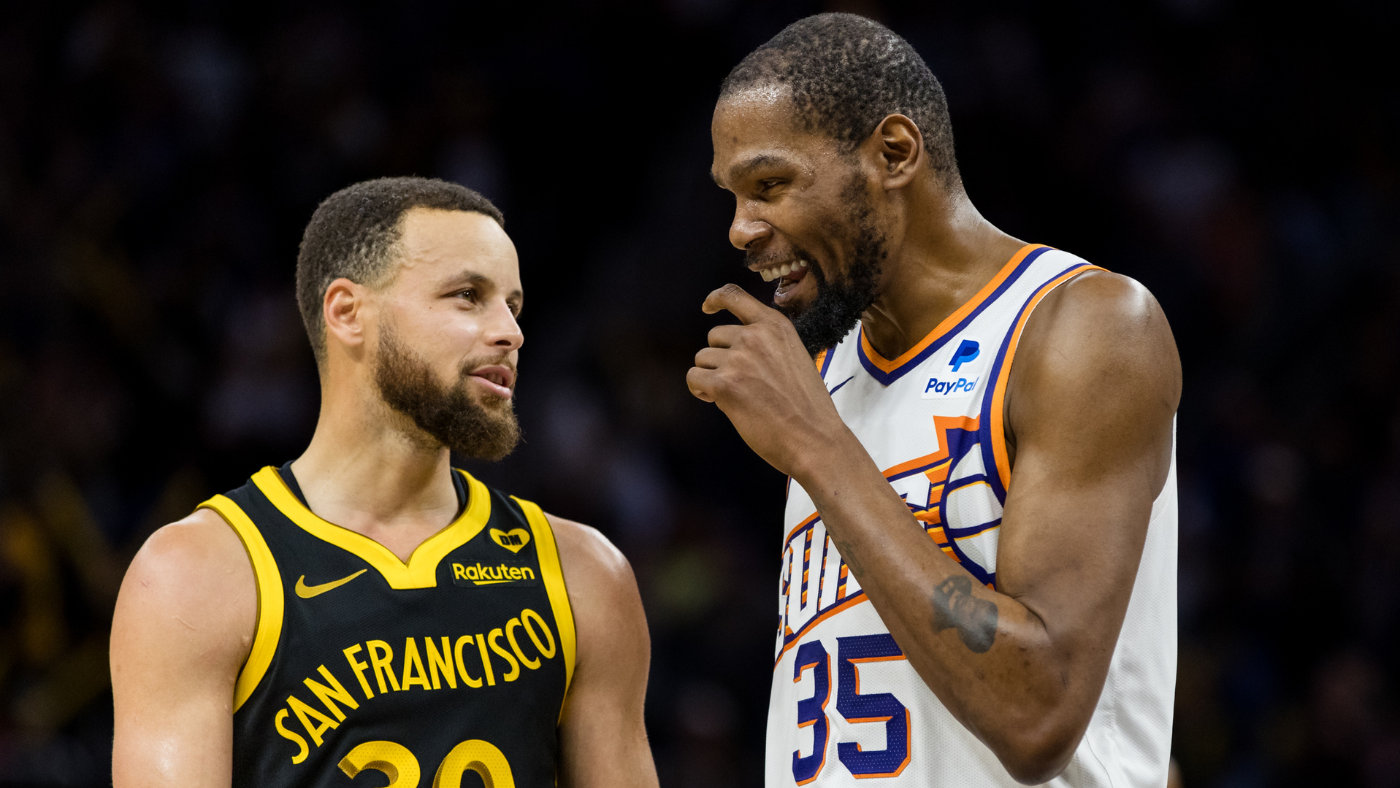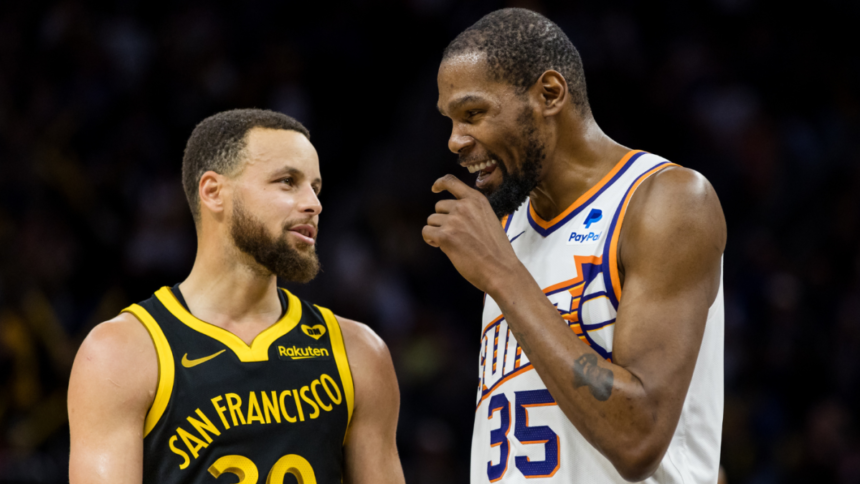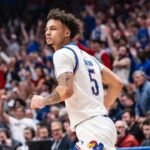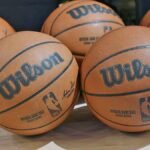
Luka Doncic and Anthony Davis was already more than enough star power for one trade deadline. De’Aaron Fox and Zach LaVine pushed the 2025 deadline to near the top of any ranking of the most active trade periods in league history. And now, the NBA is at again. It looks like at least one more superstar is in play before Thursday’s deadline: Phoenix Suns forward Kevin Durant.
Phoenix isn’t planning to trade Durant, necessarily. But according to Jake Fischer, they’re at least listening to pitches from other teams. It’s not exactly a long leap from “listening” to “considering” to “negotiating” to “finalizing.” Once these things become public, they tend to escalate.
So, what would it take to land Durant? Well, let’s think about what the Suns would want. They’re all in on winning now, but with the 36-year-old Durant gone, that doesn’t have to be right now. That means they’ll want veterans, yes, but picks are going to matter here as well purely for the sake of flexibility. The Suns are going to want to have the freedom to make future trades that they’ve recently lacked. Added financial flexibility will help as well. If they can dump Jusuf Nurkic, then all the better, though we won’t treat that as mandatory in any possible deal because the Suns do still have the three first-round picks they got from the Jazz to do that with. Devin Booker and Bradley Beal give them plenty of offense. Versatile wings and a starting-caliber center are priorities here. The idea here would be for the Suns to sacrifice older, star-level talent to balance out the roster from both an age and skillset perspective.
So let’s try to figure out what sort of deals might be on the table here. Below are five attempts to sketch out possible Durant trades ahead of Thursday’s deadline.
The first team known to have registered interest in Durant is, unsurprisingly, his former employer: the Golden State Warriors. They badly need another scorer to pair with Stephen Curry. Durant obviously fits the bill. Rarely does a team get a chance to reunite with someone that helped them win two championships. Such an opportunity exists for the Warriors. It’s just going to be costly.
Phoenix turns one star into three useful players here. Wiggins can immediately slide in as the sort of versatile wing they’ve lacked. Valanciunas is at least a usable center in small doses. The Suns reportedly have some level of interest in Kuminga. He’s the upside play for them here. Perhaps outside of Steve Kerr’s untraditional, egalitarian system, he can succeed playing a more typical brand of basketball. Think of how much better Kelly Oubre Jr. looked in Phoenix than he did with the Warriors. That’s the model here, except Kuminga is significantly more talented.
In addition to the players, Phoenix gets two unprotected Warriors picks. Add those two picks to three they got from the Jazz and suddenly Phoenix has five first-rounders to play with in order to improve. Attaching some of them to Nurkic in order to add more win-now talent would be entirely doable, especially over the summer when Nurkic becomes an expiring contract.
The Wizards are our financial facilitator of choice here because they already control Golden State’s 2030 first-round pick. The catch is that they only get it if it lands between No. 21 and No. 30. In exchange for eating two meaningful contracts, the protections on that pick become significantly lighter: now, the Wizards get that pick if it lands anywhere between No. 7 and No. 30. Considering how old the Warriors would be with a Curry-Durant-Draymond Green core, a top-six protected Warriors pick would be very valuable.
Golden State would be sacrificing most of its future to get this deal done, but would at least still hold onto Brandin Podziemski and its picks in odd-numbered years. It’s a gamble, but, well, at least there’s proof of concept. Durant, Curry and Green have won together in the past. They can win together in the future.
Golden State Warriors (featuring Jimmy Butler)
- Suns receive: Jimmy Butler, Lindy Waters, 2026 first-round pick (via Warriors), 2028 first-round pick (via Warriors), 2030 first-round pick (via Warriors, protected 1-6 and 21-30).
- Warriors receive: Kevin Durant
- Heat receive: Julius Randle, Jonathan Kuminga, Kevon Looney
- Timberwolves receive: Andrew Wiggins
- Pistons receive: Buddy Hield
Well, well, well, looks like the Suns still might have a path to Jimmy Butler after all. Yes, I know, I said we were trying to balance out the roster. Hear me out: Kevin Durant is better than Jimmy Butler, but if Butler is still the star the Suns think he is, they could use the surplus value generated in making that swap to get picks that they could turn around and trade for size and defense. In this scenario, they get the same two picks from the Warriors they did in the last trade, plus the portion of that 2030 pick we just gave the Wizards. They would then presumably try to attach those picks to Jusuf Nurkic, Grayson Allen or other pricey role players on their roster for upgrades elsewhere.
Where do the three other teams factor into this? The Pistons act as our financier here, but they don’t need to be paid to cooperate because they could actually use Buddy Hield. They’ve been a tad short on scoring since Jaden Ivey got hurt, so they simply take on an elite shooter for free and leave it at that.
Miami gets Kuminga as the centerpiece of its Butler return. He is a restricted free agent this offseason, so re-signing him would cut into their 2026 cap space plans, but in Randle and Looney, they get two contracts that will expire before then. They have reportedly been interested in Randle in the past, and he could give their offense the boost it needs to reach the playoffs this season. That means quite a bit to Miami, as missing the playoffs this year would mean that they will owe unprotected first-round picks to the Thunder in 2026 and Hornets in 2028 due to previous trades.
As for Minnesota? Aside from getting out of the failed Randle experiment, they save a ton of money off of their luxury tax bill by taking Wiggins instead. He does have an extra year on his contract, but he’s a far better fit for a Minnesota roster that needs an extra wing far more than it needs an inefficient, ball-handling power forward. I’ve explored the Wiggins-Randle component of this deal in more depth here.
The Rockets, by all accounts, want to keep their young core together for the time being. What if they could make a major trade without breaking it up? Houston is a uniquely enticing trading partner for Phoenix because the Rockets control Phoenix’s first-round picks in 2027 and 2029. If the Suns could get those picks back, several other team-building doors suddenly open. They could flip those picks again to teams that want to bet against their future. They could hold onto them and tank if they can’t build a winner in the near future. These two first-round picks are more valuable to the Suns than any picks they could get elsewhere.
In this deal, they also solve fill two important present holes. Dillon Brooks would immediately become their best 3-and-D wing. Nikola Vucevic could slide in at center. He may not be the rim-protector the Suns are looking for, but he’s a viable starter at their weakest position. Adding Brooks hopefully helps the defense enough to survive his presence on that end of the floor.
Chicago is seemingly looking for a first-round pick for Vucevic as we speak, but Whitmore is likely more valuable than any pick they could reasonably get. A high-upside scoring wing with two more years left on his rookie deal, the Rockets just haven’t had minutes available for him. Chicago obviously would.
The question for Houston here is whether or not they’re willing to sacrifice two of their best trade assets for a very brief boost in championship odds. Durant could get them to the Finals here and now. He’s also 36 with a lengthy injury history. Those picks could be the key to the Rockets landing a younger star later. What holds more value to the Rockets: the upside of landing a top-15 player ever for a short period, or the longer runway that would come with trading for someone younger down the line?
There’s no clear answer to that question, and it’s not even clear that a Durant trade would preclude another star move down the line. Houston would still have its own picks to work with. It would still control a valuable 2027 swap with the Nets as well, plus its incumbent young talent. Getting Durant would be a short-term play, but not exactly an all-in move. Considering how well he could fit their roster, or any roster for that matter, he’s probably worth the price.
- Suns receive: Nic Claxton, Kentavious Caldwell-Pope, 2025 first-round pick (via Magic), 2027 first-round pick (via Magic), 2029 first-round pick (via Magic), 2031 first-round pick (via Magic)
- Magic receive: Kevin Durant
- Nets receive: Anthony Black, Mo Wagner, Gary Harris
Here’s where we get funky. Durant has played for the Warriors before. The Rockets are a fairly standard star destination. Nobody is expecting Orlando to make an all-in push yet. They by no means need to. Their three best players are all 23 or younger. But really think about where the Magic are right now. They’ve had back-to-back top-three defenses, but they haven’t had a top-20 offense in 13 years. They rank dead last in the NBA in 3-point percentage and it isn’t even close. They trail the Wizards by 2.6 percentage points. That’s bigger than the gap between the No. 29 Wizards and the 19 Nets at 35.4%.
Injuries have informed those struggles, obviously, but isn’t Durant exactly the sort of player who could solve these problems? He’s a historically great shooter and late-game creator, but he wouldn’t need to take the ball out of the hands of Paolo Banchero and Franz Wagner on a possession-by-possession basis like most of the guards they’ve been linked to would. He’d be purely additive, not even taking away from Orlando’s imposing size. A theoretical Magic starting lineup with Durant would feature four players who are 6-10 or taller. Their smallest starter would be the 6-5 Jalen Suggs. Good luck scoring on them! If Durant makes sense as the finishing offensive piece for a young, defense-first team in Houston, then he does for a young, defense first-team in Orlando as well.
This is about as all-in as the Magic could reasonably get without touching their core. They’d be giving up four unprotected picks, but given the incumbent youth here, none of them would figure to be especially high. Anthony Black is probably the best asset they’re sacrificing in this deal. If Phoenix wants him, it could have him, but in this scenario, they immediately flip him to the Nets for a center that makes more sense with the rest of the Suns roster. Claxton is the best defensive big man they could hope for. Caldwell-Pope has been bad this season. If the Suns could revive him, he’s a proven, championship-caliber 3-and-D role player.
This sort of deal would raise serious questions for the Magic. Could they cultivate more offense after Durant is gone without picks to trade for it? Because this is a team that plans to win for a far longer time than Durant likely has left in the NBA. Could they afford Durant long-term? Remember, Suggs and Wagner start long-term extensions next season. Banchero does a year later. Durant would have to take a pay cut after his current deal expires in 2026 to finish his career here. But he is one of the few players in the NBA that could make the Magic contenders right now. If anyone is worth an all-in push for them, it’s probably him.
- Suns receive: Marcus Smart, Brandon Clarke, Vince Williams, Wendell Moore, 2025 first-round pick (via Grizzlies), 2027 first-round pick (via Grizzlies), 2029 first-round pick (via Grizzlies), 2031 first-round pick (via Grizzlies)
- Grizzlies receive: Kevin Durant
- Pistons receive: Luke Kennard, John Konchar, 2026 second-round pick (via Clippers), 2027 second-round pick (via Hawks)
We’re maintaining the same basic principles here that we used in the Magic trade. The picks Memphis has to offer probably aren’t going to be especially valuable. They’re too young and too good at developing players to send Phoenix any premium picks, so they have to make up for it with the volume of four first-rounders. On balance, these picks are probably slightly more valuable than the ones Phoenix would be getting from Orlando. The Grizzlies are a bit older. They’re a bit more volatile given Ja Morant’s history and Jaren Jackson Jr’s. injury history. But, by and large, the Grizzlies should expected to win for the foreseeable future.
This is probably the least inspiring player package of the deals we’ve covered thus far, but it still gets the Suns three good players. Health has been an issue for Marcus Smart lately, but he’s played well when he’s been on the floor for the Grizzlies. He’s not quite the Defensive Player of the Year he once was, but his ability to defend bigger wings would come in handy on a roster devoted to Booker and Beal. Clarke isn’t a traditional center, but he’s about as versatile defensively as reserve big men come. Williams was an incredibly promising 3-and-D prospect a year ago, but injuries have ruined this season for him thus far.
Detroit is once again our dumping ground. The Pistons get two decent second-rounders to take on Kennard and Konchar. Again, not exactly a bad outcome for them to add another shooter as they attempt to push for a playoff spot. If the Pistons can find a better use for their cap space, there are other teams that could be looped in to eat some money. This deal saves the Suns roughly $14 million in salary and a small fortune in luxury taxes, so worst-case scenario, they have room to take in a bit more salary.
The question here is whether or not the Grizzlies would go all-in at this juncture. Their interest in Jimmy Butler suggests they are open to trading for an older star, but he would come at a much lower asset cost. Durant is better. He’s also pricier. Giving up picks hurts the Grizzlies more than most teams. When you draft as well as they do, any lost pick is going to sting. They’re giving up four first-rounders here. Phoenix would probably ask for standout rookie Jaylen Wells in a deal. Memphis would counter by correctly pointing out that they now need him to guard top opposing wings with Smart gone.
Finances matter for Memphis here too. Jackson will get a new deal after next season. That’s part of why they’re likely hesitant to extend Butler. Would Durant take a pay cut after the 2025-26 season? It’s hard to say, but Memphis would have to go deep into the luxury tax to keep Durant, Morant, Jackson and Desmond Bane. Given their track record in the player development department, though, they might be able to handle that. Few teams are better at cultivating cheap supporting talent.
The Grizzlies aren’t the Magic or the Rockets. They’ve been through real playoff battles before. They know what to expect when the postseason arrives, and they have a better idea of how their team will react when the lights are brightest. Houston and Orlando has room to shrug and say “eh, we’ll trade for the next guy.” The time is now for Memphis. Yes, they’re relatively young, but they have three great players hitting their primes right now, and given Morant’s athleticism-based style, they don’t know how long that prime is going to last. They’re a team that should be open to an aggressive push before Thursday’s deadline, and there isn’t a better talent out there than Durant.







